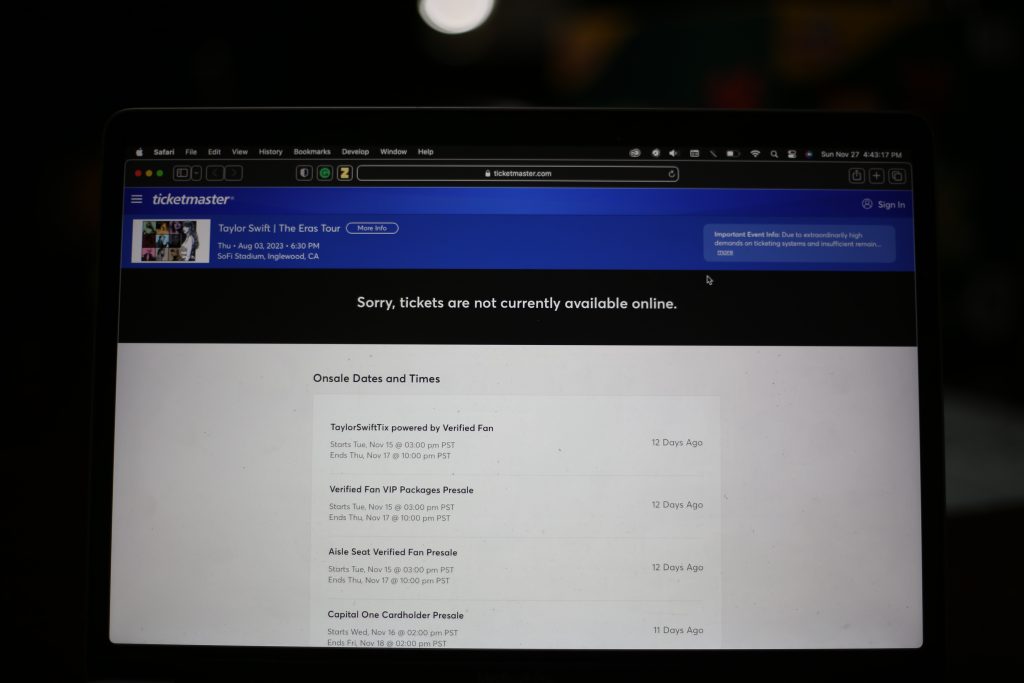Tia Trinh
Co-Arts & Entertainment Editor
The fight for classes during pass times is no joke. And for UC Santa Barbara (UCSB) students, the split-second delay of logging in just one second late could mean losing your spot in a class with two spots left open. Those anxiety-inducing moments, from clicking “login” and GOLD taking its own sweet time to load to finding out that the class is full and your schedule has fallen apart, feels like a uniquely UC experience. However, fans of music artists across the country have experienced similar feelings. For anyone familiar with Ticketmaster, such anxiety is a familiar friend when trying to buy concert tickets. This past week, Taylor Swift fans were no exception.
Live Nation Entertainment, the ticketing company that owns Ticketmaster, is currently under investigation by the U.S. Department of Justice (DOJ) for “[abuse of] power over the multibillion-dollar live music industry.”
Following a disastrous online presale for tickets on Nov. 15 to Taylor Swift’s The Eras Tour, which she announced on social media on the first of November, many fans were rightfully upset when Ticketmaster tweeted the following day: “Due to extraordinarily high demands on ticketing systems and insufficient remaining ticket inventory to meet that demand, [Friday’s] public on-sale for Taylor Swift[‘s] The Eras Tour has been canceled.”
In a statement released on their website, Ticketmaster claimed they received 3.5 billion system requests when only 1.5 million fans received presale codes. Shortly after the Capital One presale on Wednesday, Ticketmaster announced there weren’t enough tickets for the general presale. Across social media, fans protested in outrage, which was then echoed in a post by Swift on Friday morning.

At the same time, hundreds of UCSB students sat at their desks, waiting for their pass time. Slow load times felt like online queues, frantic clicking felt like trying to claim remaining tickets, and a red error message felt like failing to get just one seat.
However, the Taylor Swift ticket sale debacle isn’t what prompted this investigation. Live Nation, which has been under watch since 2010, holds a monopoly in the ticketing industry. In 2019, Live Nation was found guilty of violating various antitrust laws. The DOJ decided to extend its previous terms of settlement and, as the New York Times writes, “clarify what the company was allowed to do when negotiating ticketing deals with companies.” Yet with the messy presale just this past week, enraged fans took to social media to call out the company, shedding light onto this ongoing investigation into Live Nation’s monopolization.
This isn’t the first time Live Nation has been under fire by fans for crashing websites and a lack of tickets. Time and time again, when mainstream artists have announced tours, the site has gone down with the number of fans trying to get tickets the moment the sale opens. It just so happens that this ticket disaster in particular resulted in the investigation being reopened to the public.
However, some UCSB student sources to The Bottom Line have expressed concerns over the fact that Swift’s ticket sales were the breaking point for such a large number of people to speak out so excessively. Many fans on social media have called Swift out on relying on capitalism for profit. From the “reruns” of sales for vinyl copies of her album to dynamic pricing for tickets, her marketing strategies encourage fans to continuously spend money. Despite Swift being someone who is placed so high above everyone else, these actions force fans to realize that Swift has been relying on and will continue to use these capitalist methods to extract money. It sheds light on the dangers of parasocial relationships and the unhealthy behaviors that are often displayed on social media.
The fast pace and stress of getting tickets on Ticketmaster have, humorously enough, been compared to the environment that UCSB students go through when picking classes. Similarly, pass times and class schedules for students quickly become an issue when hundreds of students are trying to log in to a site at once.
According to second-year Faith Talamantez, logging into GOLD was slow and upon trying to add a class, “GOLD said I was exceeding my [unit] limit.” The unit cap for Pass Two is 15 units, yet adding this class would only add up to 12 units total. The issue, which has yet to be fixed, is likely to have happened to other students, causing panic and frustration.
In the case of concert ticketing, much of the attention has been redirected toward the Live Nation investigation, as it would set a standard for other companies in the United States. Should a lawsuit be filed against the company, the DOJ could break up the company and end Live Nation’s ticketing monopoly. It does not, however, help the millions of fans who lost their chances at getting tickets to their favorite artists.
Perhaps the fight for classes doesn’t come close to how serious of a situation the Live Nation investigation has become, but for many students, not getting into necessary classes can ruin schedules. Such parallels in life can be rather amusing to look at from a certain standpoint but it remains an indisputable fact that such competitiveness, whether for tickets or for classes, causes more stress than needed.
So whether or not you struggled with either of these events, what do you think is more difficult: getting Taylor Swift tickets, or getting your classes?











